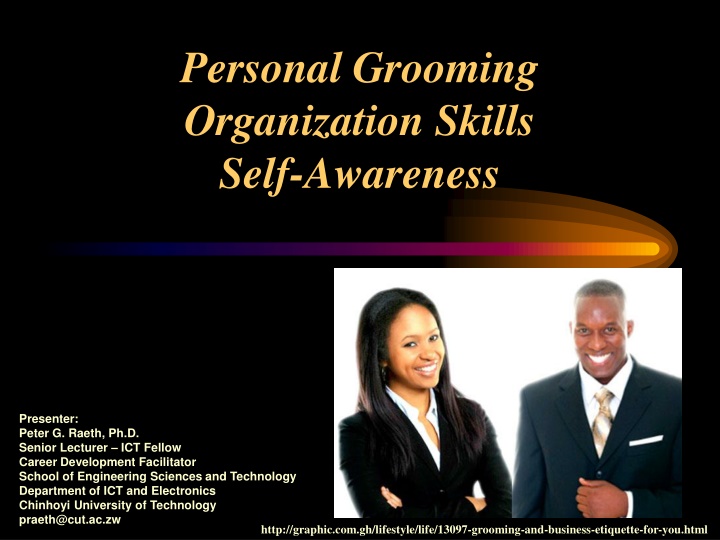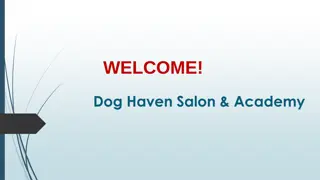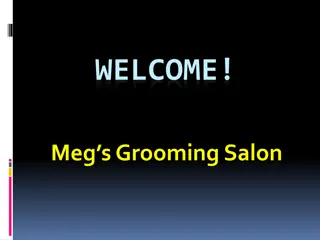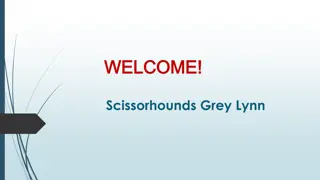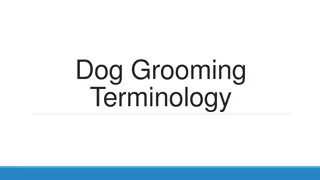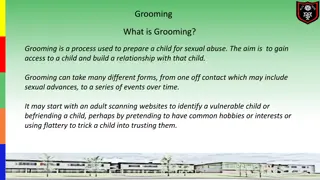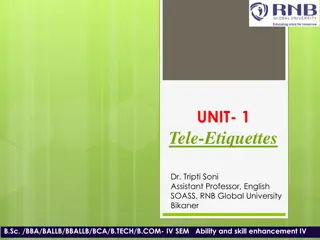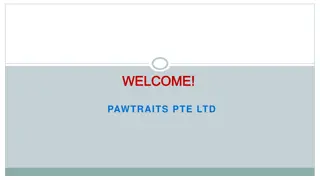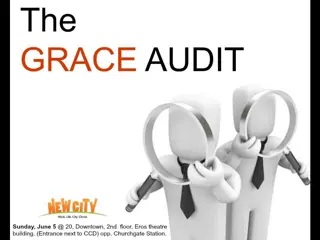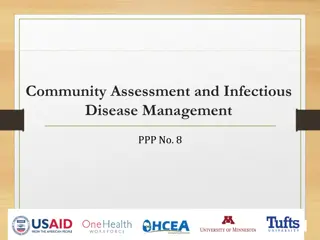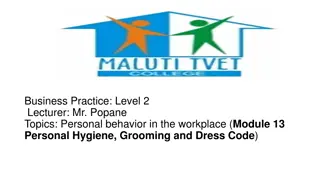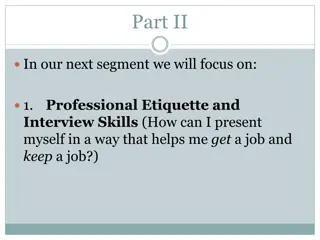Personal Grooming and Business Etiquette Presentation by Peter G. Raeth, Ph.D.
Peter G. Raeth, Ph.D., a Senior Lecturer and ICT Fellow at Chinhoyi University of Technology, shares insights on personal grooming, organization skills, and self-awareness in the context of business etiquette. The presentation covers the importance of personal image, grooming for business, and enhancing interactions within an organization, emphasizing how our appearance and behavior impact others.
Uploaded on Sep 26, 2024 | 2 Views
Download Presentation

Please find below an Image/Link to download the presentation.
The content on the website is provided AS IS for your information and personal use only. It may not be sold, licensed, or shared on other websites without obtaining consent from the author.If you encounter any issues during the download, it is possible that the publisher has removed the file from their server.
You are allowed to download the files provided on this website for personal or commercial use, subject to the condition that they are used lawfully. All files are the property of their respective owners.
The content on the website is provided AS IS for your information and personal use only. It may not be sold, licensed, or shared on other websites without obtaining consent from the author.
E N D
Presentation Transcript
Personal Grooming Organization Skills Self-Awareness Presenter: Peter G. Raeth, Ph.D. Senior Lecturer ICT Fellow Career Development Facilitator School of Engineering Sciences and Technology Department of ICT and Electronics Chinhoyi University of Technology praeth@cut.ac.zw http://graphic.com.gh/lifestyle/life/13097-grooming-and-business-etiquette-for-you.html
About the Presenter CUT Senior Lecturer and ICT Fellow Visiting from the United States this semester Degrees in Engineering, Ph.D. Computer Science 35 successful years in industry, and still going Specialty: computational science, research engineering Career Development Facilitator http://InformationAnthology.net/CareerMentor Slides for this talk http://InformationAnthology.net/StudentTransitionWorkshop
Material Integrated Mrs Emma Addo-Owusu http://graphic.com.gh/lifestyle/life/13097-grooming-and-business-etiquette-for-you.html Ms. Molly Smith, Department of Human Performance, Weber State University http://www.weber.edu/wsuimages/mollysmith/4990Presentation/Job%20Interview.ppt Internship and Career Center, University of California at Davis http://icc.ucdavis.edu/files/interviewing.ppt Savannah River Nuclear Solutions http://leap.srs.gov/files/etiquettepresentation.ppt Ms. Julie Way, Michigan Tech Career Services http://www.mtu.edu/career/about/presentations/2012-13/etiquette.ppt College of Communications, California State University at Fullerton http://commfaculty.fullerton.edu/jhayes/000-Web-HCOM100/001-PowerPoints/02-SELFAWARE.PPTselfaware_souza.ppt Mr. Jim Wilwerding, Department of Psychology, Des Moines Area Community College http://www.dmacc.edu/instructors/jwilwerding/welcome_files/Psychology%20of%20Relationships/Self-Awareness.ppt
Importance of Topic While we should not be vain, how we look matters How we behave also matters As does our interaction within an organization Three important aspects personal grooming organization skills self-awareness In our short time together we will explore these
Personal Grooming Grooming deals with issues relating to the overall physical image presented by an individual Personal image expands to enhance or detract from that of your group within an organization This image can either enhance or tarnish the impression gained by others Physical looks are a component of that impression What YOU do, or fail to do, affects others Best not be sloppy in that regard
Dress and Grooming for Business You need a sense of the style of the organization Some are informal Some are very formal Some orient on a particular national culture Dress appropriate for the situation and organization
Rules of Thumb No sleeveless shirts Have your clothes pressed No open-toe shoes Pantyhose for women Socks for men Clothes should be comfortable avoid too tight, too short Everything should be clean Nothing torn or worn out
Accessories Shoes Polished, comfortable Socks/Hose Do not be without them Belts If have belt loops, wear a belt Jewelry Minimal Purse or Attach Case Light perfume or cologne
Hints Dress for the position you want, not the position you have Men Wear a white t-shirt under your dress shirt helps with perspiration Have someone help you tie your tie if necessary Women Pull hair back Go easy on make up One ring per hand
Different clothing types Professional Dress Interview outfit Daily clothing for professional office setting Business Casual Dress Dress down Fridays or casual office environment Career Fair Casual Dress Company picnic Traveling for work
For Women at Work Wear a suit, skirt and tailored jacket, dress with sleeves, or dress with jacket in conservative style, color, fabric Be feminine, but business-like Hair in conservative style; nails manicured, short to mid-length, clear or light color polish Keep make-up and accessories to minimum - less is more
For Men at Work Wear a suit, blue or gray, in conservative style Blazer, slacks and shirt with collar but without tie are acceptable in some instances, if freshly pressed Solid color shirts Conservative ties Eliminate earrings, flashy jewelry, strong after-shave Conservative style hair, sideburns, beard Dress style shoes, polished and repaired
Organization Skills Comes down to your personal behavior Relates to mannerisms that are crucial to conducting good business and having well-functioning organizations Ranges from business, social, and communication manners in formal and informal situations Involves proper attitudes that enable individuals to function efficiently and effectively within their assigned responsibilities
Career Limiting Behavior (how to break these bad habits) Poor Time Management Prioritize Learn to say no Lack of Follow Up/Follow Through Create a project plan Publish progress reports Failure to Follow Instructions Don t skim, read for understanding Pay attention to details before submitting projects Ignoring your Career Take on a high profile project Increase your internal network Find a mentor Learn quickly Share knowledge Downplaying Personal Presence Dress for the next position Adjust your verbal and body language Never assume you are on a first-name basis Not Responding to Requests Ask for help Communicate that you can t meet the deadline, or take care of it
More Bad Habits to Break Unreliability - Stick to your commitments Not my job Attitude Procrastination Prioritize to finish important tasks Resistance to Change Negative Attitude Distracted by Phone or Watch Acting as if not interested Engage! Most importantly, LISTEN
Avoid Gossip Distance yourself from office gossip and participating in the grapevine Be able to identify rumors and gossip Be certain to have the facts before sharing information with others When someone tries to share gossip with you Walk away Change the subject Say, "I'm not comfortable talking about that
Be Aware of Generation Gap Perception of older generation: Entitlement Declining Work Ethic Less Respect for Authority Work Independently Reality of today s generation: Global and competitive market Willingness to change job for better opportunities Focus, Finish, Leave (Work/Life Balance) Desire to know Why when asked to complete a task Technology driven
Meetings Host should send a planned agenda ahead of time with clear objectives Start and stop on time Do not wait for latecomers Meetings should be focused on topics related to overall strategies Allow all participants to be involved Encourage participation Encourage interchange this is when the best ideas arise
If you are Meeting Guest Take host s lead Wait to be invited to sit Be prepared Show your attentiveness through your posture and participation
If you are Lunch or Dinner Guest Dress to impress Follow host s lead Wait to be invited to sit Avoid alcohol Order food easily negotiable with fork and knife Order middle of the road pricewise
If you are Lunch or Dinner Host Provide as much information as possible when invitation is offered Make prior arrangements for payment Nurture your personal/social relationships Wait until dessert or coffee to discuss business
At a Party or Informal Outing Don t let casual settings lull you into unprofessional behavior, consumption, or dress Participate enthusiastically Use this opportunity to meet new people Be sure to send a handwritten thank you note to your host(s) within 24 hours
People Relationship: The state of being mutually interested reverence or respect for another to be involved and concerned Maintain a database of personal knowledge on individuals in which you want to follow up or cultivate a relationship (children s names, birthdays, etc) Communicate openly and clearly Conversational topics that are generally taboo: Tasteless jokes, politics, religion, finances, family tragedy, health, life s disappointments Safe topics: Sports, Cultural events, food and local attractions, books, movies, vacation ideas Being late regularly shows selfish and disrespectful behavior
More on Relationships Make a positive and genuine connection to your co-workers and business associates Ask, How are you? and really mean it Ask about family, friends, hobbies, vacations Remember details Maintain eye contact Keep your language clean, no cursing or swearing Bring treats to the break room Join in office activities, fundraisers, and events Send prompt thank you notes or letters
Presence Show confidence, attentiveness, enthusiasm through excellent posture Present a positive, open, and friendly expression Smile often Maintain respectful eye contact Use clean and proper language Shake hands firmly and warmly
Cultures and Expectations Vary Not only between organizations and groups but also between nations and national regions We have discussed generalities that will serve you well in most situations People will know you are not from around here Most are patient, they will help you cope and learn Do your due-diligence always study lions before going into the lion s den preparing ahead earns respect Take advice from those you trust
Self-Awareness Your ability to stand outside yourself and see how your behavior and appearance impact others and the rest of the organization Know yourself Admit to yourself Do not deceive yourself Manage yourself Seek constant personal improvement Listen to wise counsel
Who are You? Self-concept: your subjective description of who you think you are Self-esteem: your evaluation of who you are Self-image: your view of yourself in particular situations Self-expectations: goals we set for ourselves
Components Attitude: A learned predisposition to respond to a person, object, or idea in a favorable or unfavorable way Beliefs: The way in which you structure your understanding of reality, whether or not that understanding reflects reality Values: Enduring concepts of good and bad, right and wrong
YOU Must Evolve in a Positive Way Your communication with other individuals Your association with groups Roles you assume Your self-labels
Does not Happen in a Vacuum Self-concept is affected by others but we are not blank slates Self-reflectiveness the human ability to think about what we are doing while we are doing it Self-observation and reflection reveal strengths that encourage us to assume new baseline roles groups self-concept behaviors
What you believe affects what you think. What people see ACTIONS What you think affects how you feel. These all lead to how you act. What you feel EMOTIONS What you think THOUGHTS BELIEF SYSTEMS Generated from your value system
Actions Affect Careers Do not deceive yourself into a failed career Types of deception Distraction Camouflage Physical deception through alteration of appearances Dissimulation concealing truth, telling half-truths Slight of hand Propaganda Self-deception concealment of self from self
Know Thyself - Leader Implications It is the most difficult task any of us faces To stay in a state of knowing ourselves To understand both our strengths and weaknesses To know what we want to do and why A leader never lies to himself especially about himself knows his flaws and assets deals with them directly Lack of awareness, whether through neglect or arrogance is a major contributor to career derailment and business failure (McCall, 1998; Bennis, 1989)
Summary Three interconnected subjects personal grooming organization skills self-awareness Three essential components of success Put the pieces together Enable your performance thereby Allows you to move forward into an increasingly brighter future
